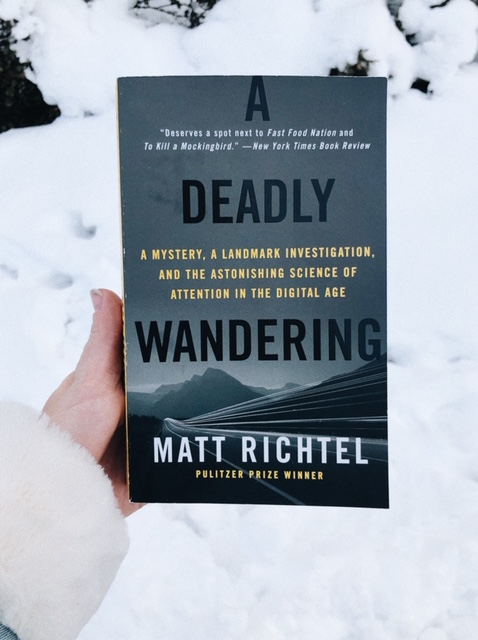Summary by Goodreads:
One of 2014’s most original and masterfully reported books, A Deadly Wandering by Pulitzer Prize–winning journalist Matt Richtel interweaves the cutting-edge science of attention with the tensely plotted story of a mysterious car accident and its aftermath to answer some of the defining questions of our time: What is technology doing to us? Can our minds keep up with the pace of change? How can we find balance? Through Richtel’s beautifully constructed narrative, a complex and far-reaching topic becomes intimate and urgent–an important call to reexamine our own lives.
On the last day of summer, an ordinary Utah college student named Reggie Shaw fatally struck two rocket scientists while texting and driving along a majestic stretch of highway bordering the Rocky Mountains. Richtel follows Reggie from the moment of the tragedy, through the police investigation, the state’s groundbreaking prosecution (at the time there was little precedent to guide the court), and ultimately, Reggie’s wrenching admission of responsibility.
Richtel parallels Reggie’s journey with leading-edge scientific findings regarding human attention and the impact of technology on our brains–showing how these devices, now thoroughly embedded in all aspects of our lives, play to our deepest social instincts and prey on parts of the brain that crave stimulation, creating loops of compulsion, even addiction. A propulsive read filled with fascinating scientific detail, riveting narrative tension, and rare emotional depth, A Deadly Wandering is a book that can change–and save–lives.

“Your time is limited, so don’t waste it living someone else’s life. Don’t let the noise of others’ opinions drown out your own inner voice. And most important, have the courage to follow your heart and intuition.” – Steve Jobs
My Thoughts:
I read A Deadly Wandering for one of my college communications classes and then proceeded to write an eight-page paper, single spaced, on the addictions of social media and the dangers these addictions put us and others in. But I’ll spare you all the scientific blabber and just dive into how much I loved this book and how amazing Pulitzer Prize winner Matt Richtel is!
I’m all about books that have a deeper meaning and teach a lesson, and, I tell you what, after reading this novel I am never going to text and drive again and I’m going to try harder to not be so attached to my phone. Richtel does a beautiful job at painting the true story of Reggie Shaw and the fatal car accident he caused because of his texting and driving. He incorporates so much emotion and enough background to allow readers to feel sorry for Reggie and relate to him, even though he caused such a heinous accident. And while showing us this tragic story, Richtel also incorporates science. He talks about how your brain uses attention (which correlates to why Reggie’s attention was taken off the road and onto his phone), the addiction of the internet (is it just the social side of it we’re addicted to? Is that why Reggie sent a text? Not because he was addicted to the internet, but because he was addicted to being connected socially?), how your mind is unable to multitask effectively (such as texting and driving), and the many studies and statistics surrounding social media, texting and driving, and much more.
Does this sound boring to you? Maybe because of all the science I just spewed out? Well, Richtel writes this story so beautifully that I never got bored. I never felt like what he was saying was too intelligent for me to understand and I never got lost in the scientific lingo.
The novel is set up this way: It has chapters that go through Reggie’s story, Terryl’s story, and many others’ stories, and then has chapters titled “The Neuroscientists” and “The Lawmakers.” Those last two mentioned are the chapters that are told less like a story and written more like an essay or textbook. But it was still written so well and talked about such interesting topics that I never got bored or overloaded with information.
This story wasn’t just about the internet, either. Surprisingly it had an underlying theme of “honesty.” The novel teaches us to be honest with others, with the things we’ve done wrong, with the addictions we have, and even more, to be honest with ourselves. My favorite quote in the novel was, “You have to save yourself before you can save other people.” Save yourself from your phone addiction, save yourself from your sadness, etc. so that you can save all of those around you.
Truly, Reggie Shaw’s story was inspiring and an emotional read. The science behind it all was informative and easy to follow. And overall, this novel climbed its way into one of my favorites.
“The tragedy was the product of a powerful dynamic, one that elite scientists have been scrambling to understand, even as it is intensifying. It is a clash between technology and the human brain.”
I recommend this book to…
…everyone. Truly. If you’ve just turned 16, you should read this. Buy this book for your teenagers to read. Read it in your book club. Read it in schools. Men, women, old, young, read this book and let it be a warning and a lesson. Not to mention, it’s an entertaining read.
Comfort Guide:
Four uses of the ‘F’ word. One use of the ‘B’ and ‘D’ word. No other curse words. Some graphic details of the accident. No sex.
Info:
Author – Matt Richtel
Published – 2014
Page Count – 390


I wish I could convince my husband of this!!!!!
Haha! Have him read this book!